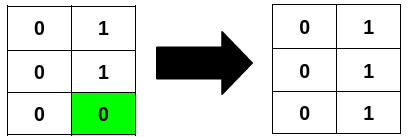Input: grid = [[1,0,0],[0,0,0],[0,0,1]]
Output: 2
Explanation:

Flipping the highlighted cells makes all the rows palindromic.
You are given an m x n binary matrix grid.
A row or column is considered palindromic if its values read the same forward and backward.
You can flip any number of cells in grid from 0 to 1, or from 1 to 0.
Return the minimum number of cells that need to be flipped to make either all rows palindromic or all columns palindromic.
Example 1:
Input: grid = [[1,0,0],[0,0,0],[0,0,1]]
Output: 2
Explanation:

Flipping the highlighted cells makes all the rows palindromic.
Example 2:
Input: grid = [[0,1],[0,1],[0,0]]
Output: 1
Explanation:

Flipping the highlighted cell makes all the columns palindromic.
Example 3:
Input: grid = [[1],[0]]
Output: 0
Explanation:
All rows are already palindromic.
Constraints:
m == grid.lengthn == grid[i].length1 <= m * n <= 2 * 1050 <= grid[i][j] <= 1